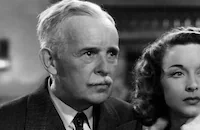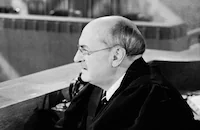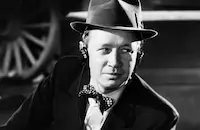Espionage Agent

Brief Synopsis
Cast & Crew
Lloyd Bacon
Joel Mccrea
Brenda Marshall
Jeffrey Lynn
George Bancroft
Stanley Ridges
Film Details
Technical Specs

Synopsis
As war flares in North Africa, the U.S. consulate in Tangiers is flooded with Americans desperate to return home. Among them is Brenda Ballard, who has obtained a forged passport in exchange for her services on behalf of German espionage. Brenda meets Barry Corvall, an attache at the consulate, when she staggers into his office and faints. Barry, who is returning to Washington to attend foreign service school, becomes infatuated by Brenda, and when the two sail for America on the same boat, he falls in love with her. Although Barry proposes night after night, Brenda refuses to marry him because she knows that he comes from a family of career diplomats and her past would destroy his future. In Washington, Barry completes his studies, and upon passing his examinations, he is assigned to the Paris consulate. Against his mother's wishes, Barry finally becomes engaged to Brenda, and on the eve of their marriage, Karl Muller, a German spy, appears and orders Brenda to steal some secret plans. Compelled by Muller's demands, Brenda confesses her past to Barry, thus forcing him to resign from the foreign service. Realizing that the U.S. has no defense against spies like Muller, Barry determines to expose the workings of the espionage ring. He and Brenda decide to risk their lives by going to Geneva to infiltrate the ring. There, Brenda convinces Paul Strawn, one of the spies, that she and Barry are willing to sell U.S. military and industrial secrets. Discovering the location of the spies's headquarters, Barry eavesdrops on a meeting and learns of their plans to spread national disaster throughout America. Realizing that he needs evidence to convince Congress, Barry and Brenda try to flush the spies out of their headquarters with the plans. Their scheme backfires, however, and Rader, the head of the ring, takes Brenda hostage aboard a train bound for Germany. Barry follows and rescues Brenda, and after securing the plans, they make a daring escape by plane. In Washington, Barry uses his evidence to convince the government of the necessity to combat espionage in the U.S.

Director

Lloyd Bacon
Cast

Joel Mccrea

Brenda Marshall

Jeffrey Lynn

George Bancroft

Stanley Ridges

James Stephenson

Howard Hickman
Martin Kosleck

Nana Bryant
Davis Roberts

Hans Von Twardowsky
Lucien Prival

Addison Richards
Edwin Stanley

Granville Bates
Grace Hayle
Egon Brecher

Emmet Vogan
Willy Kaufman
John Voight
William Hopper
Glen Langan
Lionel Royce
Henry Victor

Lloyd Ingraham
Chris Martin
Stuart Holmes
Al Lloyd
Eddie Graham
Sally Sage
John Harron
Fern Barry
Alice Connors
Louis Adlon
Vera Lewis
Robert Middlemass
Dorothy Vaughan
Sidney Bracy
Alex Melesh

George Irving
Selmer Jackson
William Worthington

John Hamilton

Eddie Acuff
Rolf Lindau
Winifred Harris
Frederick Lindsley
Hans Schumm
William Vaughn
George Davis
Ferdinand Schumann-heink
Frederick Giermann
Lester Scharff
Henry Von Zynda
Jean De Briac

Nella Walker
Billy Mcclain
Fred Vogeding
Arno Frey
Sarah Edwards
Mary Forbes
Loia Cheaney
Lottie Williams
Sven Borg
Chris Frank
Crew
Milo Anderson
Robert Henry Buckner
Ralph Dawson
Elmer Decker
Adolph Deutsch
Frank Donoghue
Warren Duff
Louis F. Edelman
Michael Fessier
Leo F. Forbstein
Jo Graham
James Hilton
Charles Rosher
Jack Saper
Francis J. Scheid
Howard Shoup
Jack L. Warner
Perc Westmore
Carl Jules Weyl

Film Details
Technical Specs

Articles
Espionage Agent
Joel McCrea plays the scion of a family of career diplomats, an attaché at the U.S. consulate in Tangiers. There he meets Brenda Marshall, an American desperate to flee war-torn North Africa with a forged passport obtained in exchange for spy services on behalf of Germany. The two fall in love, but her past forces him to resign from foreign service. The two then work together to expose a vast espionage ring working within the States.
Warners took a bold step in making Espionage Agent as well as the earlier Robinson piece. Most studios at the time, still dependent on lucrative foreign markets, didn't want to alienate other governments and risk having their pictures banned. The film was released one day after President Franklin Roosevelt signed the Neutrality Act of 1939, a bill he pushed through Congress, against isolationist wishes, that maintained official neutrality while allowing for the "cash and carry" sale of munitions to countries fighting against the Axis powers. Anticipating this move and recognizing the importance of American manufacturing to the war effort, the screenwriters (among them novelist James Hilton, who contributed additional dialogue uncredited) had the Nazi spy ring working to disable the industrial capabilities of the U.S. (a theme that would be taken up again in Alfred Hitchcock's Saboteur (1942), after America's entry into the war).
The working title of Espionage Agent was the far less provocative and exciting "Career Man." This was Brenda Marshall's first credited screen role. She had a promising start at Warners with roles opposite Errol Flynn in The Sea Hawk (1940), John Garfield in East of the River (1940), and James Cagney in Captains of the Clouds (1942). She married William Holden in 1941 and made only a handful of pictures before retiring in 1950.
Future TV Superman George Reeves has a small uncredited part as secretary to Lowell Warrington, played by Jeffrey Lynn.
Less than a year after the release of Espionage Agent, Joel McCrea would be fighting enemy agents on screen once again as the star of Alfred Hitchcock's wartime thriller Foreign Correspondent (1940).
Espionage Agent was shot by the innovative and much respected Charles Rosher, winner (shared with Karl Struss) of the first Academy Award for cinematography for F.W. Murnau's beautiful silent classic Sunrise (1927). Rosher would win another Oscar® several years later for The Yearling (1946). His first film was Life of Villa (1912), a documentary about the Mexican revolutionary Pancho Villa. One story that circulated around Hollywood at the time was that Villa insisted Rosher film the funeral of a friend. The service lasted three days, and although Rosher had run out of film a half day into it, according to the story, he pretended to keep filming for fear of being shot.
Director: Lloyd Bacon
Producer: Hal B. Wallis
Screenplay: Warren Duff, Michael Fessier, Frank Donoghue; story by Robert Buckner
Cinematography: Charles Rosher
Editing: Ralph Dawson
Art Direction: Carl Jules Weyl
Original Music: Adolph Deutsch
Cast: Joel McCrea (Barry Corvall), Brenda Marshall (Brenda Ballard), Jeffrey Lynn (Lowell Warrington), George Bancroft (Dudley Garrett), Stanley Ridges (Hamilton Peyton).
BW-84m. Closed Captioning.
by Rob Nixon

Espionage Agent
Quotes
Trivia
Notes
The working title of this picture was Career Man, and it marked Brenda Marshall's screen debut. Although the character played by Martin Kosleck is credited onscreen as "Mr. Mullen," he is called "Mueller" throughout the film. In an early draft of the Screen Achievements Bulletin, James Hilton was credited with screenplay, but this was later changed to additional dialogue. Reviews compared the picture to Confessions of a Nazi Spy because of its expose about espionage.















